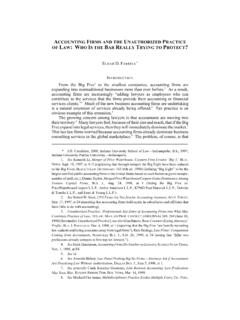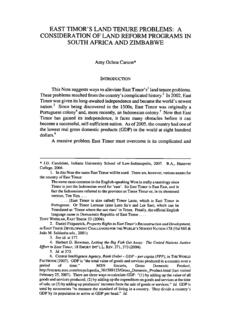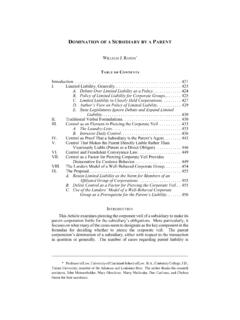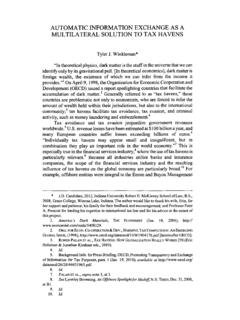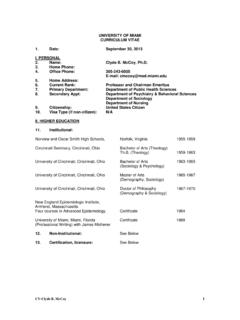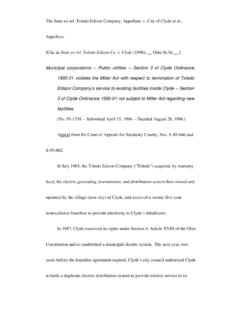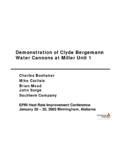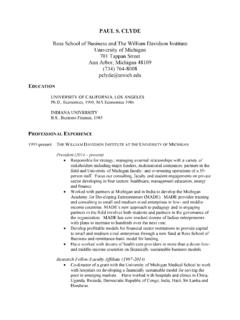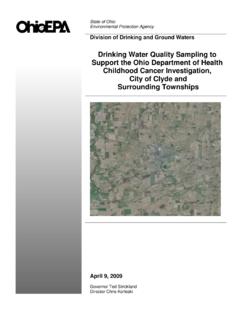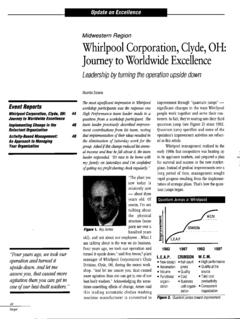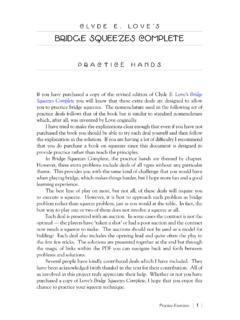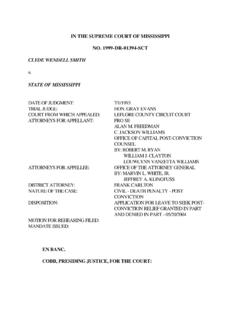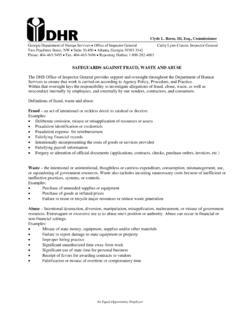Transcription of PROFESSOR CLYDE H. CROCKETT A PERSONAL …
1 PROFESSOR CLYDE H. CROCKETTA PERSONAL recollection AND TRIBUTEWILLIAM F. HARVEY* PROFESSOR CLYDE H. CROCKETT retired from the law school s faculty in joined the faculty in 1973. He was an able teacher who respected students. He was a splendid faculty member because he understood the standards andcriteria that establish the purpose and function of a law school as an academicinstitution in a community of schools and colleges called a was taken at the University of Texas School of Law. He receivedan from the same institution. He attended the London School ofEconomics. He was a Judge Advocate in the United States Air Force, and aGeneral Attorney in the United States Maritime Commission. He was theDirector of the International Trade Law Program in the Law School. He taughtcourses in Admiralty, Civil Procedure, Conflict of Laws, Federal Jurisdiction,International Civil Litigation, and International first met in the summer of 1973.
2 He entered my office to introducehimself. He was as new to legal education as I was to the law school s deanshipthat commenced only a few days earlier in that summer. Initial impressions are said to be the strongest. My initial impression ofClyde CROCKETT was strong and it did not change during the next twenty-fiveyears. His constant personality was a delightful mixture of cheer with discipline,a gentle impishness blended with profound respect, and wisdom undiluted by thetrivia that daily pervades schools of higher education and law schools inparticular. He displayed politeness, manners, and goodwill toward others whonever understood those norms or delighted in repudiating them with boisterouscontempt. Always, he showed kindness and compassion from the core of hisbeing. This showing was not limited to special friends, or selected students, orto a dean who could affect his life and career.
3 It was and is the man himself. Infew words, he was genuine. He had the right stuff. Almost fifty years ago, Justice Felix Frankfurter returned to the Harvard LawSchool and spoke to a graduating class. In his comments, the Justice said that thelaw, more than any other profession, discipline, or calling, has been concernedwith those standards, those criteria, those appeals to right and reason, that havehad a dominant share in begetting a civilized society. PROFESSOR CROCKETT waseducated in these ideals and ideas. He brought them to his classroom and to thelaw school. He understood magnificent principles, standards, criteria, and theirhistory. He brought them to an American legal educational community that had begunits disintegration into sophistic babble. Let us listen to PROFESSOR CROCKETT sopponents, and understand their Standards? Criteria? Judgment? What are these?
4 To today stype of realist, a postmodernist Derrida-dandy, appeals to right and reason, anda dominant share in begetting a civilized society are disgusting triumphalism! *Dean Emeritus and Carl M. Gray Emeritus PROFESSOR of Law, Indiana University Schoolof Law LAW REVIEW[Vol. 35:1 What is a civilized society? No one can say because there are no standardsfor such a concept. If you offer a judgment then you are merely judgmental andprobably infected by DWEMs (dead white European males). If you express anopinion it cannot be superior to other opinions because there are no standards.(Well, other than this one, but do not talk about this one either). As for FelixFrankfurter who is he? Constitutional Law. This subject, they announce, is the greatest ruse in a lawschool s curriculum. It is a course with a large, heavy, expensive book filledwith cases that are valid only because the Justice or judge who wrote the opinionreceived five votes, or some other form of numerical agreement.]
5 You doubt what we say? Well, then, ask one of our own: Justice WilliamJ. Brennan. He would tell you, as he told his law clerks: the only thing thatmatters in this Court is the most important word in Constitutional Law. Thatword is five. Look, law clerk, Brennan might say, get me five votes, andwe have the law. What a guy! What a sense of history! Such institutionalintegrity! Look at Criminal Law say the contemporary realists. When ProfessorCrockett attended law school or when he commenced teaching, the allegationsstate, Criminal Law was addressed in an archaic manner. People really thoughtin terms of crime and the moral standards that, ultimately, defined crime. Thatwas an ancient regime. Today s law school rulers allege that crime is nothingmore than the way that persons are perceived by the police, and then arrested andaccused. One cannot say that an act is criminal.
6 If an act destroys property sobe it because private property is theft anyway. If an act harms another person,then seek the cause that can be understood only in terms of poverty,dispossession, or an unequal distribution of goods. If children are involved, thenif it is necessary to save them you may kill them. This is, was it not, the teachingof Attorney General Reno?In rebuttal, PROFESSOR CROCKETT might have quoted from Leroy S. Rouner whowrote that the best thing ever written on the philosophy of education is Plato sProtagoras. (Leroy S. Rouner, Resolved: That Phi Beta Kappa is GloriouslyUseless, 66 THE KEY REPORTERS 1, 4-6 (2000)). Protagoras was a sophist, anethical relativist who would teach a student how to make a speech withoutknowing what justice or the content of the speech really means. When a youngman asks Socrates to make arrangements for this instruction, Socrates asks thecrucial question: If you study with this fellow, what will he make of you?
7 Rouner continues saying that this is not a question that a college dean soffice will address today. In legal education, the condition is much worse thanRouner s college Stephen B. Presser, Raoul Berger PROFESSOR of Legal History atNorthwestern University says that something has gone radically awry with legaleducation. (Stephen B. Presser, Can America s Legal Education Be Fixed?,CHRONICLES 50-53 (Jan. 2001)). Today s lawyers commonly regard the law asan infinitely malleable set of theories and doctrines that can be manipulated byjudges at the prompting of clever advocates. With the triumph of legal realismat Yale and Columbia in the 1930s and 1940s, law professors (in those schools,but clearly not everywhere at that time) believed that there are no overarching2001] tribute TO CLYDE H. CROCKETT3ethical or other principles in the law. Thus, a wholesale attack on thedoctrines of constitutional law occurred.
8 By the late Twentieth Century,prominent professors at Yale, with straight faces, could say that there was noneed to amend the Constitution. A living Constitution can be altered simplyby judges acknowledging the articulated desires of the people. Of course, PROFESSOR Presser states, the people are Yale law school doubt the Yale crowd had a moment of great pride when their mostdistinguished graduate defined reality by insisting that it depends on what themeaning of is is. Perhaps their greatest moment arrived when this samegraduate had to plea bargain his exit from the White House in order to end histerm in office without Presser s solution for reforming legal education is to return to arequired curriculum with a heavy dose of the history of American law. He says, As the rule of law has eroded in recent years and the Constitution has beenpummeled, it is no wonder that we have trembled on the edge of urban unrest,plunged into the crass excesses of materialism, and completely lost our moralbearings.
9 He refers to Chief Judge Harry Edwards of the United States Courtof Appeals for the District of Columbia Circuit. PROFESSOR Presser states thatJudge Edwards article in the Michigan Law Review in 1992, in which he saidthat law schools are obsessed with impractical theories and law firms maximizingrevenues, means that both law schools and law firms have disregarded the ethicalpractice of is much more that PROFESSOR Presser might have observed. Thereaction to the criticism by Judge Edwards was entirely predictable and entirelybeside the point. The reaction was (a) require more hours in legal ethics coursestaught in law schools, and (b) demand that all members of the state s bar attendcontinuing legal educational classes in ethics during a calendar year. Thisresulted in little more than adding substantial cost burdens to the law student,whose law schools costs and incurred debt are appallingly excessive already, orthe attorney, who can not afford either the time or the money.
10 All of this occursbecause of nothing more than an assumed benefit. It is that the law student or theattorney will be an ethical person. The spirit of the thing seems to be, take thesecourses or continuing legal educational courses, and then you will be it! This assumed benefit can be postulated only by disregarding the wholesaleabolition of ethical standards, the dismissal of a moral order, the repudiation ofultimate social criteria, the abolition of American and British legal history, thecorrosive rejection of the laws and history of organized religion(s) in a lawschool curriculum, and the denial of classical educational criteria that occurthroughout the courses in today s law school a philosophy! What a basis for law! But this was not ProfessorCrockett s doing. These are not the principles (should one say, non-principles )that he understood and defended in his fine career.
